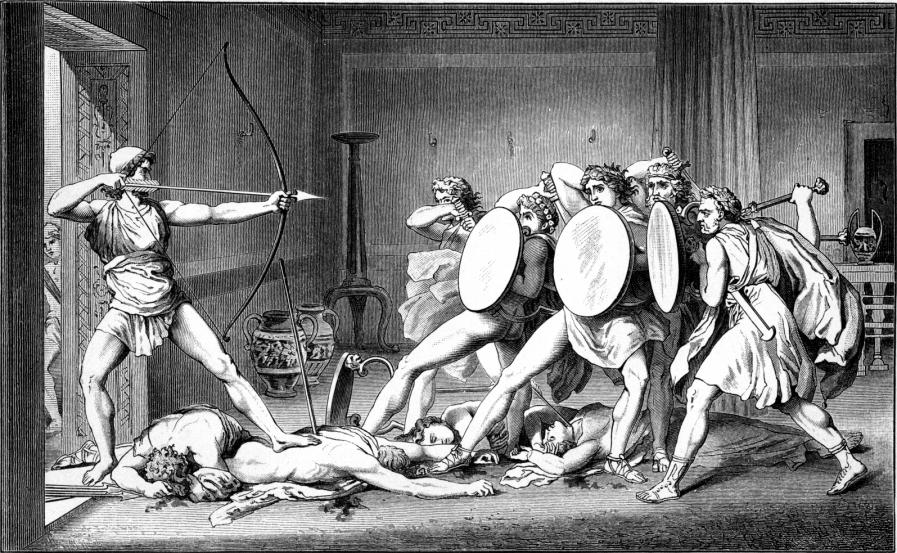Let the Bloody Show Begin
At day's end what's left to be said? What use a play of false forbearance, or calculated regret? Too late now for redress, for false pardon or indulgence. Fate and a song have long decreed those favoured few to be reprieved. A bōw, or a bŏw, and a change of dress, changes not the bloodied scene. - Anne Dromache November 24th 2020
Book 21: An archery contest
pp. 460-475
Penelope with slaves in tow, fetches Odysseus' famed and curved bow. Well armed her beaus with arrows aplenty, that will quiver and spin when strung and aimed at axes hung all in a row. So ordained be their will. Alone, aloud be it said: here only one destined to win - the rest, they will be dead. - Anne Dromache November 24th 2020
Astute she may be, but Penelope is oblivious that she too now is slave – to Athena’s scheme, so assiduously brought to fruition in cahoots with Odysseus, and nearing its fulfilment!
The swineherd and cowherd pass their final test of fealty; and with that the lives of Eumaeus and Philoetius saved, and Odysseus reveals to them his person and receives them as co-conspirators.
One after the other, the cocky crew of “wanna be’s” show off only the limitations of their prowess, and Antinous seeing what lays ahead for him – no, not that; his prescience only stretching as far as the contest – suggests the competition be held over for one day, as this day is Apollo’s day and the god obviously angered at their meddling in what famously is his sport.
Odysseus will try, and is roundly rebuked, but Penelope takes his side, and Telemachus too. Having played her part, a role of which she knows not of, to perfection, mother Penelope’s exit is insisted upon. For the eyes of neither mother nor wife is that which follows fit. The die is cast; the bow is passed into great practised hands and his gifts and person then displayed. As the book ends, father and son stand united:
With his eyebrows he signaled, and his son strapped on his sword, picked up his spear, and stood beside his chair next to his father, his bronze weapons flashing. Book 21 [lines 431-434] The Odyssey, trans. Emily Wilson
Book 22: Bloodshed
pp. 476-493
More than expose himself; a deadly exposition:
Odysseus ripped off his rags. Now naked, he leapt upon the threshold with his bow and quiver full of arrows, which he tipped out in a rush before his feet, and spoke. "Playtime is over [...] Book 22 [lines 1-5] The Odyssey, trans. Emily Wilson
Hardly surprising; Antinous, the most troublesome of all is the first to fall, and ever lurking Fate and the goddess Athena, guised as Mentor or hovering in the rafters orchestrating the carnage, decrees all the suitors to follow suit on their bloody way to meet their own fate.
Spared only are Phemius, the famous singer – thinks Odysseus in this moment of his legacy to be told in song? And, for his son’s sake, the house boy Medon – he, who calls Telemachus “friend”.
At the hands of the other herdsmen, an ugly death awaits the goat herd Melanthius – does Odysseus think this a favour, an honour, that he grant them this gruesome deed? Eurycleia is too easily “forced” into role of denunciator – twelve slave girls will pay, but not before they have cleaned Odysseus’ house of the massacre and its remnants – a cruel extra, known well enough in modern times.
A final fumigation; as a cure against lurking evil. But, will it cleanse the soul? And, the hero weeps. Or does he? For more precisely: “…seized by sweet desire to weep…” [500-501]. The condemned slave girls; they did really weep as they made rid of the hero’s bloody carnage, to then be ushered to a drawn out death.
And, for Odysseus, has home been at long last reached? And, was it worth it?

